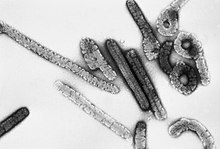 The maker of Darvon and Darvocet announced Friday that it will stop marketing the widely used painkillers in the U.S. because of a new study linking the active ingredient in the drugs to serious and sometimes fatal heart rhythm abnormalities.
The maker of Darvon and Darvocet announced Friday that it will stop marketing the widely used painkillers in the U.S. because of a new study linking the active ingredient in the drugs to serious and sometimes fatal heart rhythm abnormalities.
Xanodyne Pharmaceuticals Inc., of Newport, Ky., agreed to the ban at the request of the Food and Drug Administration, which also asked makers of generic versions of the drugs' core compound, known as propoxyphene, to stop selling it in the U.S.
Darvon, Darvocet painkillers pulled from the U.S. market
Canadians vote against fluoridated water supplies
 Campaigners against fluoride believe that adding fluoride to the water supply is tantamount to poisoning and are lobbying for fluoridation to be stopped all over Canada. Opponents of fluoride claim the chemical is illegal, unnecessary and dangerous; campaigners believe fluoride contributes to health conditions, including increased risk of cancer, thyroid disease and arthritis.
Campaigners against fluoride believe that adding fluoride to the water supply is tantamount to poisoning and are lobbying for fluoridation to be stopped all over Canada. Opponents of fluoride claim the chemical is illegal, unnecessary and dangerous; campaigners believe fluoride contributes to health conditions, including increased risk of cancer, thyroid disease and arthritis.
Airport X-ray scanner is just as likely to kill you as a terrorist bomb
 The controversial machines have been brought in at major airports across the globe, including the UK, leading to fears that the increased exposure to harmful radiation may cause cancer.
The controversial machines have been brought in at major airports across the globe, including the UK, leading to fears that the increased exposure to harmful radiation may cause cancer.
Now a US physics professor has added to the debate by claiming that the scanners are redundant because you are just as likely to contract cancer from the radiation as you are to die in a terrorist bomb on your flight.
Pharmaceutical firms hire scofflaw doctors
 Several of the nation's largest pharmaceutical companies said they plan to tighten screening of physicians who promote their drugs after ProPublica reported last month that more than 250 of them had been sanctioned for misconduct.
Several of the nation's largest pharmaceutical companies said they plan to tighten screening of physicians who promote their drugs after ProPublica reported last month that more than 250 of them had been sanctioned for misconduct.
Eli Lilly and Co. said that next year, for the first time, it would hire an outside firm to search for state disciplinary actions against its hired speakers and advisers. Lilly, the seventh-largest company by U.S. prescription sales, did not previously conduct such screening and was unaware of the dozens of actions ProPublica found against its speaker.
Redeeming Role for a Common Virus: Ability to Kill Cancer
 A common virus that can cause coughing and mild diarrhea appears to have a major redemptive quality: the ability to kill cancer. Harnessing that power, researchers at Georgetown Lombardi Comprehensive Cancer Center, part of Georgetown University Medical Center, are conducting a clinical trial to see if the virus can target and kill certain tumor types.
A common virus that can cause coughing and mild diarrhea appears to have a major redemptive quality: the ability to kill cancer. Harnessing that power, researchers at Georgetown Lombardi Comprehensive Cancer Center, part of Georgetown University Medical Center, are conducting a clinical trial to see if the virus can target and kill certain tumor types.
World Health Organization takes on tobacco lobby
 President Jose Mujica described Uruguay Monday as a "laboratory of confrontation" with Big Tobacco.
President Jose Mujica described Uruguay Monday as a "laboratory of confrontation" with Big Tobacco.
Philip Morris International Inc., the world's second-biggest cigarette company after the state-controlled China National Tobacco Corp., is pursuing a claim before World Bank arbitrators alleging that Uruguay is violating its trade agreement with Switzerland by requiring that anti-smoking warnings cover 80 percent of cigarette packages.
Educated families increasingly refusing vaccinations
 "This was the first time we'd seen a drop -- and it was a pretty big drop," Sarah Thomas, vice president of public policy and communication at NCQA, is quoted as saying to HealthDay. "We didn't really explore the reasons [for the trend], but one leading hypothesis is that parents have decided not to get their children vaccinated because of concerns about the potential for side effects and even autism."
"This was the first time we'd seen a drop -- and it was a pretty big drop," Sarah Thomas, vice president of public policy and communication at NCQA, is quoted as saying to HealthDay. "We didn't really explore the reasons [for the trend], but one leading hypothesis is that parents have decided not to get their children vaccinated because of concerns about the potential for side effects and even autism."
More Articles...
Page 131 of 233

 Health Glance
Health Glance






























